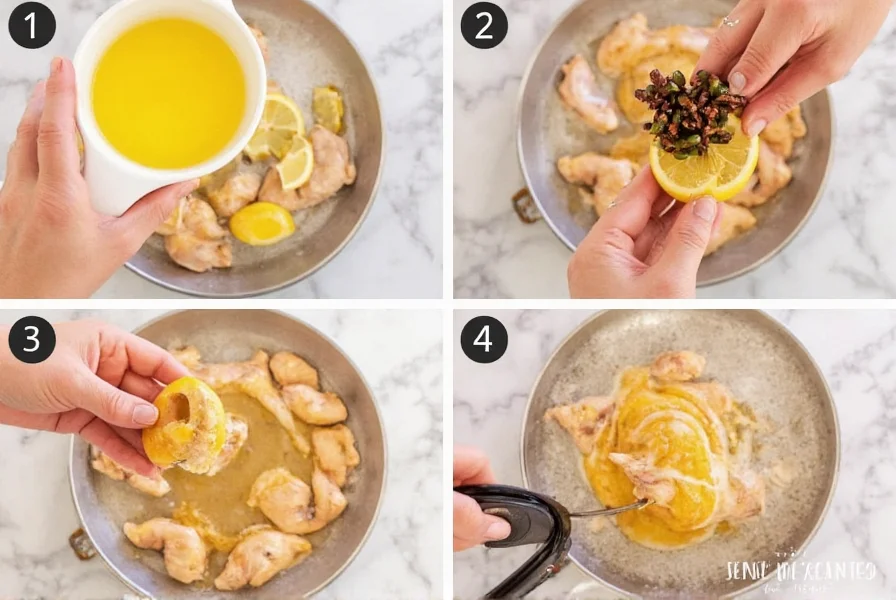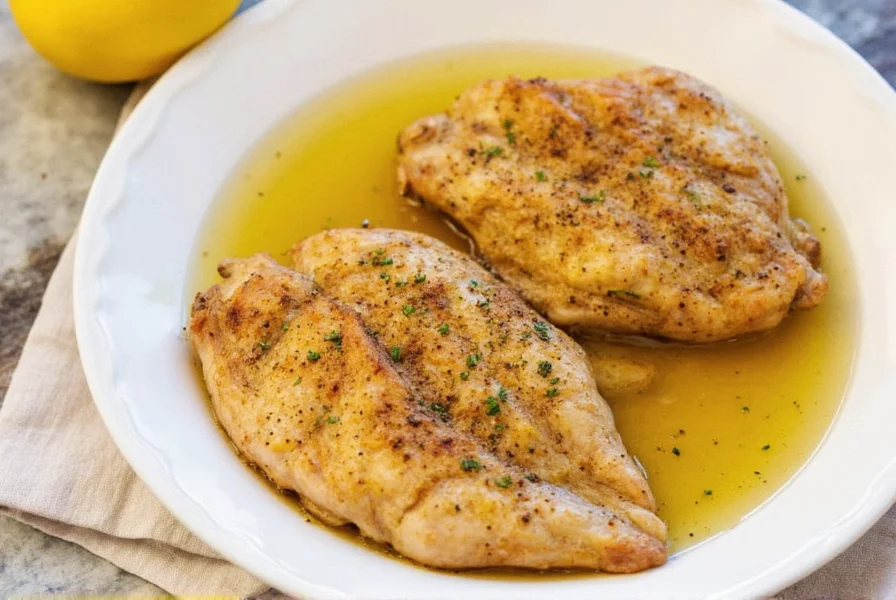The classic lemon and pepper chicken marinade represents one of the most versatile preparations in global cuisine, balancing bright acidity with warm spice to enhance poultry's natural flavors. Unlike many marinades that rely heavily on sugar or soy sauce, this citrus-forward formula works exceptionally well for health-conscious cooking while delivering restaurant-quality results. Understanding the science behind each component transforms this simple preparation from basic to extraordinary.
Consumer preference data validates its mainstream appeal: The 2023 International Food Information Council Food & Health Survey found 17% of respondents identified "citrus flavor" as their preferred poultry seasoning profile, ranking it third behind savory/herb (28%) and grilled/natural (25%). This positions lemon pepper as a scientifically preferred choice for its bright, clean taste profile among health-conscious households.
Why Lemon and Pepper Create the Perfect Marinade Balance
Lemon juice's citric acid gently breaks down chicken proteins, allowing for better flavor absorption while maintaining texture integrity. Food safety researchers at the University of Nebraska-Lincoln confirm this process reaches optimal balance within 2-4 hours, beyond which excessive protein denaturation causes textural degradation. The key is using fresh juice rather than bottled varieties, which often contain preservatives that create bitter notes. Freshly cracked black pepper provides complex volatile compounds that release gradually during cooking, creating layered heat rather than immediate burn. This dynamic duo works synergistically—citrus compounds actually enhance our perception of pepper's aromatic qualities.
| Ingredient | Function | Optimal Quantity |
|---|---|---|
| Fresh lemon juice | Acid tenderizer and flavor carrier | 1/4 cup per pound of chicken |
| Fresh lemon zest | Intensifies citrus aroma without acidity | 1 teaspoon per pound |
| Freshly cracked pepper | Provides complex heat and aroma | 1 tablespoon per pound |
| Extra virgin olive oil | Carries fat-soluble flavors and prevents drying | 2 tablespoons per pound |
Marinating Science: Critical Time Thresholds
| Marinating Duration | Protein Reaction | Texture Outcome |
|---|---|---|
| < 2 hours | Insufficient protein breakdown | Surface-level flavor only |
| 2-4 hours | Controlled denaturation (optimal) | Even flavor penetration, firm texture |
| > 4 hours | Excessive protein degradation | Mushy, mealy texture |
Source: University of Nebraska-Lincoln Food Safety, "Marinating and Food Safety" (https://food.unl.edu/web/fnnf/marinating-and-food-safety)
When to Use (and When to Avoid) This Marinade
While versatile, this marinade has specific applications where it excels and others where alternative approaches are better. Understanding these context boundaries ensures optimal results:
| Scenario | Recommended | Scientific Rationale |
|---|---|---|
| Boneless chicken breasts/thighs | Yes | Achieves full penetration within 4 hours (USDA FSIS) |
| Whole chicken | No | Marinades penetrate < 1/8 inch (University of Illinois Extension) |
| Slow cooking methods | Avoid | Extended acid exposure causes irreversible texture damage |
| Pre-brined chicken | Adjust salt | Additional salt causes moisture loss (Cornell Food Science) |
Source: University of Illinois Extension, "Marinating Meats" (https://web.extension.illinois.edu/meats/marinating.cfm)
Step-by-Step Preparation Guide for Best Results
Begin by whisking together fresh lemon juice, olive oil, and minced garlic in a non-reactive bowl—glass or stainless steel works best as citrus can react with aluminum. Add freshly cracked black pepper, lemon zest, dried oregano, and salt, then whisk vigorously to emulsify. Place chicken in a resealable bag or shallow dish, pour marinade over evenly, and massage gently to ensure complete coverage. Refrigerate for exactly 2-4 hours—any longer and the acid will begin to 'cook' the chicken, resulting in a mealy texture.

Avoiding Common Marinating Mistakes
Many home cooks make critical errors that compromise their lemon pepper chicken results. Never use the same marinade for basting that touched raw chicken—reserve a portion before adding to poultry. Avoid excessive salt, which draws moisture from chicken and creates toughness. Skip the temptation to add sugar, which caramelizes too quickly on grill surfaces. Most importantly, never marinate beyond 4 hours as the citric acid begins breaking down proteins excessively, creating an unpleasant texture. For best grilled results, remove chicken from marinade 30 minutes before cooking to allow surface drying, which promotes better browning.
Regional Variations Worth Trying
While the classic preparation shines in Mediterranean cuisine, global variations offer exciting alternatives. In Southeast Asia, adding 1 tablespoon fish sauce creates umami depth without overpowering citrus notes. Italian versions often incorporate 2 sprigs fresh rosemary, while Greek adaptations include 1 teaspoon dried mint. For a California-inspired twist, substitute half the lemon juice with Meyer lemon juice for a more floral, less acidic profile. Each variation maintains the essential lemon-pepper foundation while introducing complementary flavor dimensions that work particularly well with specific cooking methods.

Perfect Pairings for Your Marinated Chicken
Lemon pepper chicken's bright profile pairs beautifully with complementary sides that enhance rather than compete. Roasted asparagus with lemon zest provides textural contrast while reinforcing citrus notes. Quinoa pilaf with toasted pine nuts offers nutty counterpoint to the pepper's heat. For heartier meals, consider creamy polenta that balances the dish's acidity. When selecting wine, opt for unoaked Chardonnay or dry Riesling—their crisp acidity mirrors the marinade's brightness without overwhelming delicate chicken flavors. Remember that the marinade's simplicity makes it exceptionally versatile across cooking methods: grill for smoky notes, pan-sear for crispy skin, or bake for consistent results.
Frequently Asked Questions
How long can I safely marinate chicken in lemon pepper marinade?
Chicken should marinate in citrus-based marinades for 2-4 hours maximum. Beyond this timeframe, the acid begins to break down proteins excessively, resulting in a mealy texture. For food safety, never exceed 24 hours in refrigeration, though quality deteriorates significantly before this limit.
Can I use bottled lemon juice for my chicken marinade?
Freshly squeezed lemon juice delivers superior flavor compared to bottled varieties. Bottled juices often contain preservatives and lack the bright, complex notes of fresh citrus. The difference is particularly noticeable in simple marinades where lemon serves as the primary flavor component. For best results, always use fresh lemons.
What's the best way to prevent chicken from drying out when using citrus marinades?
To prevent drying, always include 1-2 tablespoons of olive oil per serving in your marinade. The oil carries fat-soluble flavors while creating a protective barrier that helps retain moisture during cooking. Additionally, avoid overcooking—remove chicken from heat when it reaches 155°F (68°C) as it will continue cooking to the safe 165°F (74°C) during resting.
Can I freeze chicken in lemon pepper marinade?
Yes, freezing marinated chicken works well for meal prep. Place chicken and marinade in a freezer-safe bag, removing excess air. Freeze for up to 3 months. Thaw overnight in the refrigerator before cooking—never cook from frozen as this prevents proper flavor development and creates texture issues.
Why does my lemon pepper chicken sometimes taste bitter?
Bitterness typically comes from two sources: over-marinating (beyond 4 hours) or including too much lemon zest (the white pith contains bitter compounds). Always use a microplane for zest to avoid the bitter pith, and never exceed recommended marinating times. If bitterness occurs, balancing with a small amount of honey during cooking can help counteract it.











 浙公网安备
33010002000092号
浙公网安备
33010002000092号 浙B2-20120091-4
浙B2-20120091-4